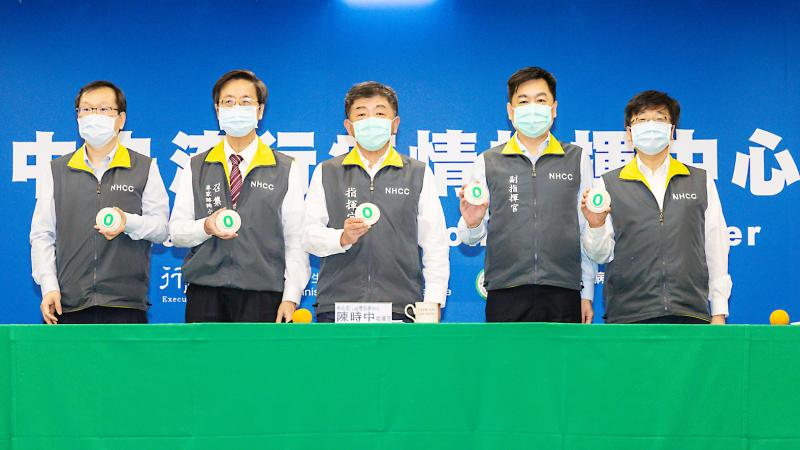The Central Epidemic Command Center (CECC) yesterday released disease prevention guidelines ahead of the three-day International Workers’ Day weekend that starts today, as it reported no new COVID-19 cases for the fifth straight day.
The guidelines include several recommendations that have been repeated by authorities since the initial outbreak of the novel coronavirus, such as maintaining good personal hygiene.
People should avoid touching their eyes, nose and mouth, and maintain social distancing of at least 1.5m when indoors and 1m outdoors, they say, adding that when social distancing cannot be maintained, a mask should be worn.

Photo: CNA
If going outdoors, it is best to visit open spaces where there are no crowds, the guidelines say.
A mask should be worn when in areas that are crowded, enclosed or lacking good ventilation, as well as in situations where there would be an unspecified number of people or close contact with other people, they say.
In the guidelines, the center also recommended that people avoid dining in restaurants with close seating and social gatherings in the form of meals.
The center reported no new COVID-19 cases for the fifth consecutive day.
The last domestic case of the novel coronavirus was recorded on April 12.
Minister of Health and Welfare Chen Shih-chung (陳時中) told a daily briefing at the center in Taipei that people can now adopt a “happier” and “more relaxed” attitude.
The risk of community transmission has been “lowered to a minimum,” said Chen, who heads the center.
More people are recovering from the disease, with 322 of the nation’s 429 confirmed cases released from isolation, he said.
With the personal income tax filing season starting today, Chen encouraged people to file online.
Due to the COVID-19 pandemic, the Ministry of Finance has pushed back this year’s deadline to file personal taxes from June 1 to June 30, giving people two months — instead of the usual one — to file their taxes.
Asked under what conditions the center would consider discontinuing its daily briefings, Chen said that while it has not deliberated the matter, it might contemplate decreasing the frequency from daily to every two days.
At the briefing, the center also displayed mugs with the words “Taiwan Can Help” gifted by President Tsai Ing-wen (蔡英文).
Tsai on Facebook thanked the nation’s frontline medical workers for their dedication since the outbreak began.
Flower growers in Tainan also sent anthuriums to the center to thank its workers and reporters, said Deputy Minister of the Interior Chen Tsung-yen (陳宗彥), who is deputy head of the center.
Tuesday was the 100th day since the center opened.

Right-wing political scientist Laura Fernandez on Sunday won Costa Rica’s presidential election by a landslide, after promising to crack down on rising violence linked to the cocaine trade. Fernandez’s nearest rival, economist Alvaro Ramos, conceded defeat as results showed the ruling party far exceeding the threshold of 40 percent needed to avoid a runoff. With 94 percent of polling stations counted, the political heir of outgoing Costa Rican President Rodrigo Chaves had captured 48.3 percent of the vote compared with Ramos’ 33.4 percent, the Supreme Electoral Tribunal said. As soon as the first results were announced, members of Fernandez’s Sovereign People’s Party

EMERGING FIELDS: The Chinese president said that the two countries would explore cooperation in green technology, the digital economy and artificial intelligence Chinese President Xi Jinping (習近平) yesterday called for an “equal and orderly multipolar world” in the face of “unilateral bullying,” in an apparent jab at the US. Xi was speaking during talks in Beijing with Uruguayan President Yamandu Orsi, the first South American leader to visit China since US special forces captured then-Venezuelan president Nicolas Maduro last month — an operation that Beijing condemned as a violation of sovereignty. Orsi follows a slew of leaders to have visited China seeking to boost ties with the world’s second-largest economy to hedge against US President Donald Trump’s increasingly unpredictable administration. “The international situation is fraught

MORE RESPONSIBILITY: Draftees would be expected to fight alongside professional soldiers, likely requiring the transformation of some training brigades into combat units The armed forces are to start incorporating new conscripts into combined arms brigades this year to enhance combat readiness, the Executive Yuan’s latest policy report said. The new policy would affect Taiwanese men entering the military for their compulsory service, which was extended to one year under reforms by then-president Tsai Ing-wen (蔡英文) in 2022. The conscripts would be trained to operate machine guns, uncrewed aerial vehicles, anti-tank guided missile launchers and Stinger air defense systems, the report said, adding that the basic training would be lengthened to eight weeks. After basic training, conscripts would be sorted into infantry battalions that would take

GROWING AMBITIONS: The scale and tempo of the operations show that the Strait has become the core theater for China to expand its security interests, the report said Chinese military aircraft incursions around Taiwan have surged nearly 15-fold over the past five years, according to a report released yesterday by the Democratic Progressive Party’s (DPP) Department of China Affairs. Sorties in the Taiwan Strait were previously irregular, totaling 380 in 2020, but have since evolved into routine operations, the report showed. “This demonstrates that the Taiwan Strait has become both the starting point and testing ground for Beijing’s expansionist ambitions,” it said. Driven by military expansionism, China is systematically pursuing actions aimed at altering the regional “status quo,” the department said, adding that Taiwan represents the most critical link in China’s